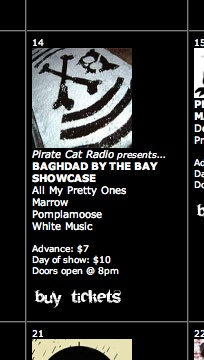These days I mostly prefer to fly on Virgin America. Their flight experience is a huge step above most of the other domestic carriers (friendly service, decent seats, regular non-prison inmate faucets, etc.) and touches like plugs in every seat, a good entertainment system (although there’s also a huge unfinished post about improving that), and now wifi, all at a competitive price makes it pretty much a no-brainer for me.
So, it’s always been a little surprising that for an airline with such a strong focus on branding and flight experience that seems targeted at people like me would have such a bad online experience.
I’m actually not going to bitch too much about the website (you know, about how it’s slow, has weird bookmark-unfriendly urls with weird sessions, is much too dependent on Flash with lots of weird interactions where it consistently takes me multiple times to log in because it’s login form doesn’t tab properly, etc). but rather to focus something that happened to me today that should have been a good thing.
I had a 2PM-ish flight back home today. At 11:30AM, an email gets sent to me from telling “Virgin America Guest Services” about an “Important Schedule Change Notification”:
Your flight has been impacted by a schedule change which may result in the departure time of your flight being earlier than previously scheduled.
That’s actually great – well, certainly better to be notified as soon as possibly than not to find out at all. And besides being good customer service, I’m sure it’s good on VA’s end if they can reduce the amount of shuffled seating that kind of schedule change might cause. However, it continues:
We’d encourage you to login to the Check-In / Travel Manager section of our website at virginamerica.com to view your current itinerary. You’ll need your elevate login information or your confirmation code (see below) and your last name to access your itinerary. If you have any questions regarding the new time please contact our Reservations call center at 1.877.FLY.VIRGIN (1.877.359.8474) between the hours of 3:30am – 11:30pm PST. You may already be aware of the new departure time and will not need to take any action at this time.
Now, this is cut and pasted directly from the email. It is an HTML email, but it doesn’t include even a link to the site, not to mention a link to the flight information. This of course is made doubly frustrating by the fact that it is a personalized email that includes my name, address, and confirmation number. Now, I’m not a rocket scientist, couldn’t they just save a step and include the flight information and what changed? If for some reason they couldn’t, why wouldn’t they include a direct link to that information? That’s all before you try to load the VA site on your phone. (Which works, barely, on my iPhone. Good luck with that if you don’t have 3G or WebKit.)
It seems that VA would actually save money if they could streamline this, since as it is, they probably get a lot of people calling rather than looking at the email and finding out what they need.
Since I like VA, the next step for me was replying and letting them know that it’d be great if they could include the information, a link or something mobile friendly. Unfortunately, once I got home, I saw that it was sent to a no-reply email address (bounced!). There’s no other contact VA from the email, unless you want to spend time on the call center, which isn’t a good use of anyone’s time.
Well, since I really do like VA (have I mentioned it’s incredibly easy to standby on an earlier flight?), I decide to go to the website and contact them… and after writing out my brief issues with 4 bullet points, it turns out there’s a 1024 character limit (yes, that’s 7 tweets and no dynamic character counter).
At this point, I probably should have given up, but I’m a sucker for sunk costs, so I went to look for an online character counter and started shaving off characters and doing some txt squeezing. In the end, they got my “feedback,” but it did get me thinking about this whole chain of events, and about how lots of these little bad UX decisions can compound to ultimately burn good will really quickly (and how difficult this sort of thing is to measure).
Now, I don’t think that this had a particularly big effect on my feelings about VA getting me from point A to point B decently, however it’s interesting to me when I compare say their level of quality/attention to detail for things like their safety video (the best I’ve seen) vs their online/digital UX.
From my perspective, I also think that there’s a pretty strong business case, and at least from some of these, ROI is calculable (ie, bucket-testing call % or missed flight percentage if you A/B test variations of the initial email), but for most of the rest of it, it’s not. To some degree, I also wonder whether a company like VA (or almost any company) really values how much of their UX and ultimately, (marketing, customer service, and brand) is dictated/deeply impacted by their online experience. They must have the numbers on what percent of their sales come through the website and what percentage of them are subscribed to email or use the mobile web.
Anyway, enough rambling. Now I’m just putting off all the work I need to do before my next flight…

